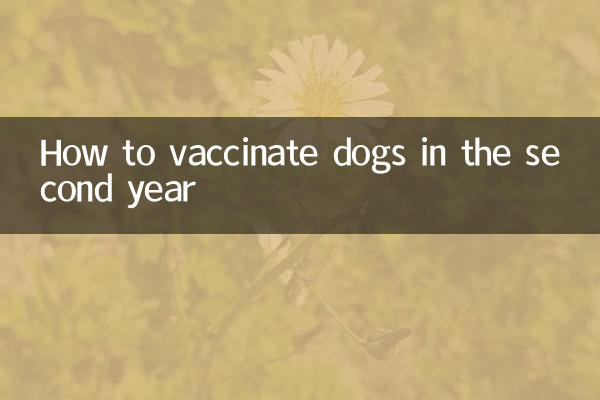How to vaccinate dogs in the second year
With the improvement of pet health awareness, more and more owners are paying attention to dog vaccination issues. Especially the method of vaccination in the second year, many owners have doubts. This article will combine the hot topics and hot content on the Internet in the past 10 days to provide you with detailed answers to the dog vaccination guide for the second year.
1. Why do I need to be vaccinated in the second year?

Dog vaccination is not a one-and-done thing. After the first year of basic immunization, booster immunization is required in the second year to maintain the level of antibody protection. Here are the core reasons to get vaccinated in year two:
| Reason | Description |
|---|---|
| Antibody decay | Antibody levels will decrease over time after vaccination in the first year and need to be strengthened in the second year |
| disease risk | Failure to vaccinate in time may cause dogs to be infected with fatal diseases (such as canine distemper, parvovirus) |
| herd immunity | Regular vaccinations help reduce the spread of disease in the pet community |
2. What vaccines are needed in the second year?
In the second year, vaccines are divided intocore vaccineandNon-core vaccinesTwo categories. Core vaccines are required for all dogs, while non-core vaccines are determined based on the dog’s living environment and risks.
| Vaccine type | disease protection | vaccination frequency |
|---|---|---|
| core vaccine | Canine distemper, canine parvovirus, rabies, etc. | 1 time per year |
| Non-core vaccines | Leptospira, canine influenza, etc. | On veterinary advice |
3. Specific procedures for vaccination in the second year
1.Make an appointment with your veterinarian in advance: It is recommended to contact your veterinarian 1-2 weeks before expiration to ensure vaccine supply.
2.health check: The veterinarian will check the dog’s health condition before vaccination. Vaccination needs to be postponed if there is fever or illness.
3.vaccination record: Carry a vaccination booklet for the first year so that the veterinarian can check the vaccination history.
4.Observation after vaccination: Stay in the hospital for 30 minutes of observation to prevent allergic reactions.
4. Frequently Asked Questions
| question | answer |
|---|---|
| Can vaccination be postponed? | Delay for up to 1-2 weeks. Long-term delay may require re-vaccination of basic immunizations. |
| Is your dog lethargic after vaccination? | Normal reaction, recovery in 1-2 days; if it persists, seek medical attention |
| Is rabies vaccination mandatory? | Yes, required by law and critical for both humans and dogs |
5. Hot topics of discussion on the entire network
Recent hot topics about dog vaccines mainly focus on the following aspects:
1.vaccine safety: Some owners are worried about the side effects of the vaccine, and experts recommend choosing regular institutions for vaccination.
2.price difference: Prices vary widely in different regions and hospitals, so consultation is required in advance.
3.Mixed vaccine controversy: The discussion on the advantages and disadvantages of single-conjugate vaccines and multi-conjugate vaccines continues to heat up.
6. Summary
Vaccinations for dogs in their second year are key to ensuring their health. Owners should strictly follow the schedule recommended by veterinarians to vaccinate core vaccines, and choose non-core vaccines based on actual needs. Regular vaccination not only protects pets, but is also responsible for social public health.

check the details

check the details